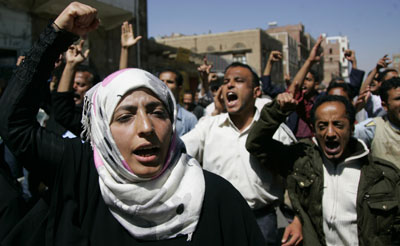“We are disturbed by the targeting of journalists that is spreading across multiple countries in the Arab world,” said Mohamed Abdel Dayem, CPJ’s Middle East and North Africa program coordinator. “The governments of Sudan and Yemen are physically attacking journalists in an effort to disrupt the free delivery of news to local and international audiences. Those governments seem to not have learned anything from the mistakes made by the governments in Tunis and Cairo.”
On Sunday, Sudanese authorities beat several journalists and detained at least eight, local reporters told CPJ. Security forces detained Hamza Baloul of Al-Ahdath daily, Rashid Abd al-Wahab and Ali Ahmad Haj al-Amin of Ajras al-Huriya, Sara Taj al-Sir of Al-Sahafa, Ahmed Sir al-Khatam of the pro-government Akhbar al-Youm, Fatima al-Ghazali of Al-Jarida, photographer Mohamed Marzouq of Al-Akhbar, and cameraman Mohamed Amer of Al-Ikhlas television while they were covering student protests against rising food and gas prices in Khartoum. At least two of them, Hamza Baloul and Ali Ahmad Haj al-Amin, remain in custody.
Today, security forces prevented the distribution of the opposition newspapers Ajras al-Huriya and Al-Sahafa at their printing house, according to Reuters. Ajras al-Huriya Deputy Editor Fayez al-Silaik said his paper was targeted for covering the protests. “The confiscation of the paper reflects a state of panic and fear that the Sudanese government is experiencing because of the winds of change that are sweeping through the region, and these totalitarian regimes see in the press their first enemy,” he told local journalist Abdelgadir Mohamed Abdelgadir.
In Yemen, journalists have been harassed amid street protests calling for the ouster of President Ali Abdullah Saleh. The country is entering its second week of street protests against corruption and mismanagement and partly inspired by street demonstrations in Tunisia and Egypt. On Saturday, security forces tried to attack three woman journalists with sticks and shoes–Samia al-Aghbry of the opposition newspaper Al-Thawri, press freedom activist and head of the group Women Journalists Without Chains Tawakol Karman, and Bushra al-Amar of Al-Akhbar Al-Youm, al-Aghbry told CPJ. The three were not harmed as a group of young men surrounded them, creating a human shield between the journalists and security agents. Security offices subjected the women to verbal abuse and made kidnapping threats.
Karman, who was detained for two days on January 23, also received recent threats via telephone, according to her organization’s website. On January 26, Karman’s brother received a phone call from the Yemeni president, who allegedly told him it would be better to curb her and put her under house arrest and quoted a traditional saying about killing those who disobey, according to the statement from the journalist’s organization’s website.
On Thursday, security forces detained Mekhtar al-Rahbi, a journalist for the independent Yemeni weekly Al-Masdar, and confiscated his camera while he was covering a demonstration. Also that day, men in plainclothes beat Suheil satellite television cameraman Ahmad Faras and confiscated his equipment, local journalists told CPJ.
Editor’s Note: The original text of this news alert has been modified to correct the identification of Akhbar al-Youm. Akhbar al-Youm is pro-government, and not independent, as previously described.
